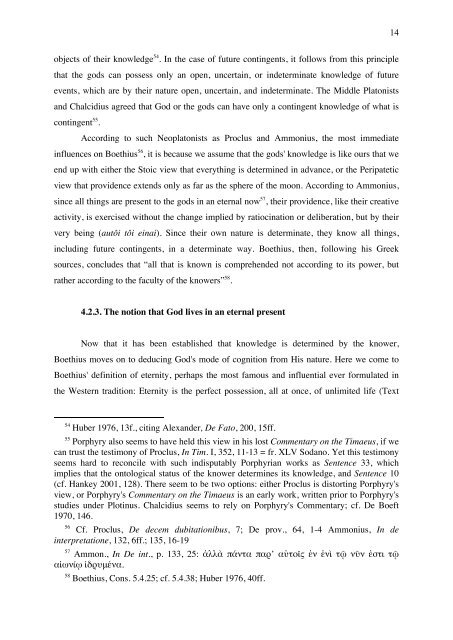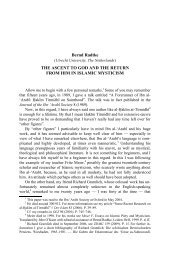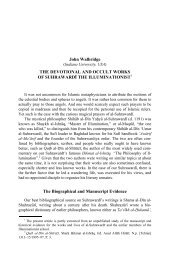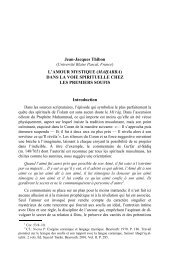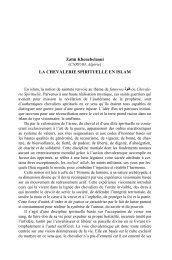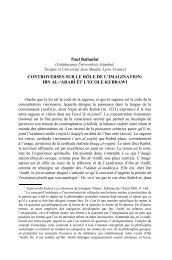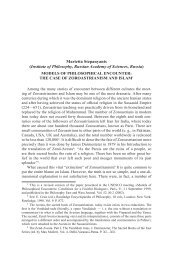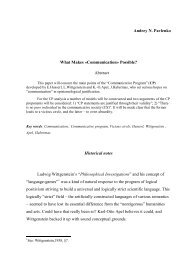Bothius talk DEF
Bothius talk DEF
Bothius talk DEF
Create successful ePaper yourself
Turn your PDF publications into a flip-book with our unique Google optimized e-Paper software.
14<br />
objects of their knowledge 54 . In the case of future contingents, it follows from this principle<br />
that the gods can possess only an open, uncertain, or indeterminate knowledge of future<br />
events, which are by their nature open, uncertain, and indeterminate. The Middle Platonists<br />
and Chalcidius agreed that God or the gods can have only a contingent knowledge of what is<br />
contingent 55 .<br />
According to such Neoplatonists as Proclus and Ammonius, the most immediate<br />
influences on Boethius 56 , it is because we assume that the gods' knowledge is like ours that we<br />
end up with either the Stoic view that everything is determined in advance, or the Peripatetic<br />
view that providence extends only as far as the sphere of the moon. According to Ammonius,<br />
since all things are present to the gods in an eternal now 57 , their providence, like their creative<br />
activity, is exercised without the change implied by ratiocination or deliberation, but by their<br />
very being (autôi tôi einai). Since their own nature is determinate, they know all things,<br />
including future contingents, in a determinate way. Boethius, then, following his Greek<br />
sources, concludes that “all that is known is comprehended not according to its power, but<br />
rather according to the faculty of the knowers” 58 .<br />
4.2.3. The notion that God lives in an eternal present<br />
Now that it has been established that knowledge is determined by the knower,<br />
Boethius moves on to deducing God's mode of cognition from His nature. Here we come to<br />
Boethius' definition of eternity, perhaps the most famous and influential ever formulated in<br />
the Western tradition: Eternity is the perfect possession, all at once, of unlimited life (Text<br />
54<br />
Huber 1976, 13f., citing Alexander, De Fato, 200, 15ff.<br />
55<br />
Porphyry also seems to have held this view in his lost Commentary on the Timaeus, if we<br />
can trust the testimony of Proclus, In Tim. I, 352, 11-13 = fr. XLV Sodano. Yet this testimony<br />
seems hard to reconcile with such indisputably Porphyrian works as Sentence 33, which<br />
implies that the ontological status of the knower determines its knowledge, and Sentence 10<br />
(cf. Hankey 2001, 128). There seem to be two options: either Proclus is distorting Porphyry's<br />
view, or Porphyry's Commentary on the Timaeus is an early work, written prior to Porphyry's<br />
studies under Plotinus. Chalcidius seems to rely on Porphyry's Commentary; cf. De Boeft<br />
1970, 146.<br />
56<br />
Cf. Proclus, De decem dubitationibus, 7; De prov., 64, 1-4 Ammonius, In de<br />
interpretatione, 132, 6ff.; 135, 16-19<br />
57 Ammon., In De int., p. 133, 25: ἀλλὰ πάντα παρ’ αὐτοῖς ἐν ἑνὶ τῷ νῦν ἐστι τῷ<br />
αἰωνίῳ ἱδρυμένα.<br />
58 Boethius, Cons. 5.4.25; cf. 5.4.38; Huber 1976, 40ff.


